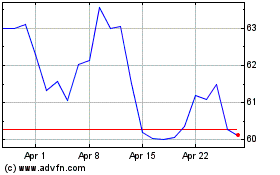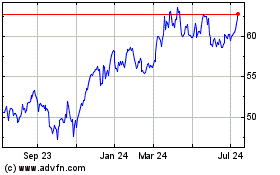Asian Shares Down, Except for China and Japan
May 19 2016 - 12:20AM
Dow Jones News
Shares in Asia were choppy and shares were sliding—except in
China and Japan—as many investors grow cautious about the stronger
chance that U.S. interest rates will rise in June.
In China, the Shanghai Composite recently rose 0.6%, while
Japan's Nikkei Stock Average opened higher but pared gains to
recently trade about flat. But Hong Kong's Hang Seng Index dropped
0.4%, Korea's Kospi fell 0.5% and Australia's ASX/S&P 200 sank
0.7%.
Many investors across the Asia-Pacific region pulled back after
the U.S. Federal Reserve's April meeting minutes suggested a June
interest-rate increase was still in the cards if data supported the
case that the American economy was getting stronger.
The U.S. dollar strengthened against its major peers after the
minutes were released, putting pressure on some Asia-Pacific stock
markets and prices for commodities.
"In Asia it should be quite negative—especially in emerging
markets we have seen the USD bid higher" against Asian currencies,
said Tareck Horchani, a senior sales trader at Saxo Capital
Markets. "This rate hike is not really a good sign. I believe we
might see some larger correction in Asia over the next few
days."
Investors were initially more positive in Japan, where stocks
were up as much as 0.5% in the early morning. Shares gained after
the yen weakened overnight.
A weaker currency helps Japanese exporters, who can sell their
goods at more competitive prices overseas and can increase earnings
made abroad when they are repatriated into yen.
"The strength of the yen has been a real problem on Japanese
exporters," said Alex Furber, senior client services executive for
CMC Markets in Singapore. The yen weakened to 110 per U.S. dollar
in the early morning, and "that's going to ease a little bit of
pressure on exporters and potentially is good for stocks," he
said.
Japanese financial shares were leading the market higher on
expectations that higher U.S. interest rates could boost their net
interest margins. Financial stocks had suffered in recent weeks in
an ultralow interest-rate environment. Dai-ichi Life Insurance Co.
rose 4.3% and Mitsubishi UFJ Financial Group Inc. advanced
3.2%.
In China, technology and telecom stocks rallied, with the
Nasdaq-style ChiNext board in Shenzhen up 2.4%. Trading volumes,
however, were thin as investors were uncertain about the Chinese
economy.
"Weak economic fundamentals and tightening liquidity as a result
of sustained [deleveraging] efforts prompted more investors to stay
on the sideline," says Jacky Zhang, an analyst at BOC
International.
In Korea, shares of Hyundai Merchant Marine Co. plummeted 11%
after the company and its creditors failed to reach an agreement
Wednesday over charter rate cuts with foreign shipowners, which is
part of its debt restructuring efforts.
The price of Brent crude oil slipped in early Asia trading hours
to $48.07 a barrel. Earlier this week, Brent had neared the
psychologically-important $50 mark but failed to breach it.
Kosaku Narioka and In-Soo Nam and Yifan Xie contributed to this
article.
Write to Dominique Fong at Dominique.Fong@wsj.com
(END) Dow Jones Newswires
May 19, 2016 00:05 ET (04:05 GMT)
Copyright (c) 2016 Dow Jones & Company, Inc.
Nasdaq (NASDAQ:NDAQ)
Historical Stock Chart
From Mar 2024 to Apr 2024

Nasdaq (NASDAQ:NDAQ)
Historical Stock Chart
From Apr 2023 to Apr 2024
